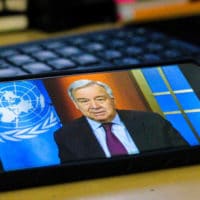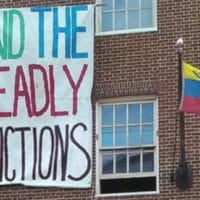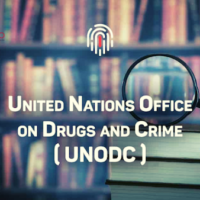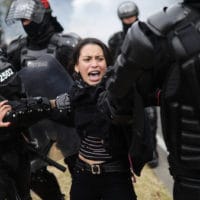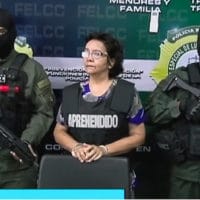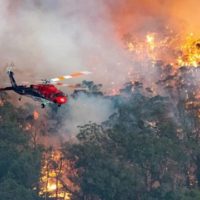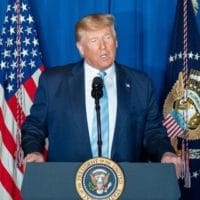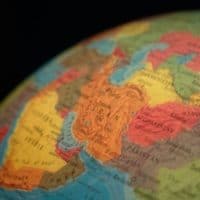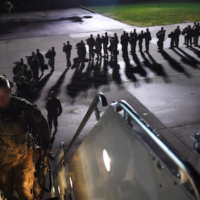-
UN Chief warns of coming recession for the Planet
Bumping elbows at the United Nations.
-
IMF refuses aid to Venezuela in the midst of the Coronavirus crisis
On March 16, 2020, the chief of the International Monetary Fund (IMF) Kristalina Georgieva wrote a blog post on the Fund’s website; it represents the kind of generosity necessary in the midst of a global pandemic. “The IMF stands ready to mobilize its $1 trillion lending capacity to help our membership,” she wrote.
-
Chris Hedges: Americans face a one-choice Election—The Oligarchy
Pulitzer-winning author and host of “On Contact” Chris Hedges joins Rick Sanchez to discuss the influence of lobbyists on establishment media in their coverage of politics and that donors, bankers and billionaires have on the U.S. political process.
-
United States Imposed Economic Sanctions: The Big Heist
The money trail of U.S. Sanctions leads to the Federal Reserve Bank of New York, which—behind the shadow of secrecy laws that effectively prohibit any form of public accountability—facilitates the theft of public wealth from targeted countries on a scale only previously accomplished through military invasion and occupation.
-
Sure, but Venezuela is the Narco State…
Venezuelan analyst Oscar Forero contextualises the accusation that Venezuela is immersed in illegal drug activity.
-
As media amplifies unrest in Venezuela and beyond, millions are quietly revolting in Colombia
Despite protests of historic proportions fueled by anger over corruption and a brutal right-wing crackdown, the unrest in Colombia has garnered remarkably little international media attention compared to Venezuela.
-
Standing up for Left literature—In India, it can cost you your life
On February 16, 2015, Govind and Uma Pansare went for a morning walk near their home in Pune (Maharashtra, India). Two men on a motorcycle stopped near them and asked for directions, but the Pansares could not help them; one of the men laughed, removed a gun, and shot the two. Uma survived the attack but Govind died in a hospital on February 20, 2015.
-
Police assault on Wet’suwet’en people
Attack shows Hypocrisy towards Indigenous Peoples.
-
Over 4000 Professors and Scholars from across Canada and around the world sign “Statement of Solidarity with the Wet’suwet’en people of British Columbia”
We ask that the illegal work on Unist’ot’en territory by Coastal Gas Link be immediately stopped. We request that the federal and provincial governments respect Indigenous rights as outlined in our constitution, in countless court rulings, as well as the United Nations Declaration of the Rights of Indigenous people (UNDRIP) and ‘Anuc niwh’it’en (Wet’suwet’en law)
-
This is the time for solidarity, not stigma
In December 2019, several people began to develop infections in Wuhan (People’s Republic of China); early signs indicated that the virus had emerged out of the Huanan Seafood Wholesale Market, but there is no certainty about that verdict.
-
Libya is being torn apart by outsiders
Ghassan Salamé is the head of the United Nations Support Mission in Libya. He took over this job in 2017, six years after the catastrophic NATO war on Libya. What Salamé inherited was a country torn into shreds, two governments in place—one in Tripoli and one in Tobruk—and one civil war that had too many factions to name.
-
OPCW investigator testifies at UN that no chemical attack took place in Douma, Syria
In testimony before the United Nations Security Council, former OPCW inspection team leader and engineering expert Ian Henderson stated that their investigation in Douma, Syria suggested no chemical attack took place. But their findings were suppressed.
-
Military repression aims to silence social unrest in Latin America
For popular movements in Latin America and the Caribbean, achieving high levels of political awareness and organisation is not enough whilst the ruling classes, in one way or another, maintain control of the armed forces.
-
NLG calls upon U.S. to immediately comply with International Humanitarian Law in its illegal occupation of the Hawaiian Islands
As the longest running belligerent occupation of a foreign country in the history of international relations, the United States has been in violation of international law for over a century.
-
Bolivia’s new right-wing government intensifies crackdown on journalists, doctors
The U.S.-backed administration of Jeanine Añez is arresting prominent members of the press and even doctors in what it calls a “dismantling of the propaganda apparatus of the dictatorial regime of Evo Morales.”
-
Climate scientist: I witnessed Australia on fire. Climate change is already here.
Prior to beginning my sabbatical stay in Sydney, I took the opportunity this holiday season to vacation in Australia with my family. We went to see the Great Barrier Reef—one of the great wonders of this planet—while we still can. Subject to the twin assaults of warming-caused bleaching and ocean acidification, it will be gone in a matter of decades in the absence of a dramatic reduction in global carbon emissions.
-
Iraqi PM reveals Soleimani was on peace mission when assassinated, exploding Trump’s lie of ‘imminent attacks’
The Trump administration claimed Iranian general Qasem Soleimani was planning “imminent attacks” on U.S. interests when it assassinated him. That lie was just destroyed, but not before countless corporate media outlets transmitted it to the public.
-
Is this the end of U.S. interference in West Asia?
Iran’s Foreign Minister Javad Zarif reacted strongly to U.S. Secretary of State Mike Pompeo’s suggestion that Iraqis were “dancing in the street” to celebrate the assassination. On Twitter, Zarif posted pictures of the funeral procession for Soleimani and wrote, “End of U.S. malign presence in West Asia has begun.”
-
Social Media and social control: How Silicon Valley serves the U.S. State Department
Facebook isn’t the only Silicon Valley firm with partisan oversight of what we see: the bipartisan billionaire class and their security state have partnered with tech firms since the dawn of the internet to control the parameters of users’ thinking.
-
WaPo’s Afghan papers propagate colonial narrative of noble intentions gone awry
In an earlier article (FAIR.org, 12/18/19) regarding the Washington Post’s Afghanistan Papers (12/9/19), I discussed how the Post’s exposé also exposed the Post as one of the primary vehicles U.S. officials use to spread their lies, and why it’s impossible for corporate media outlets like the Post to raise more substantive questions about the deceptive nature of U.S. foreign policy.

